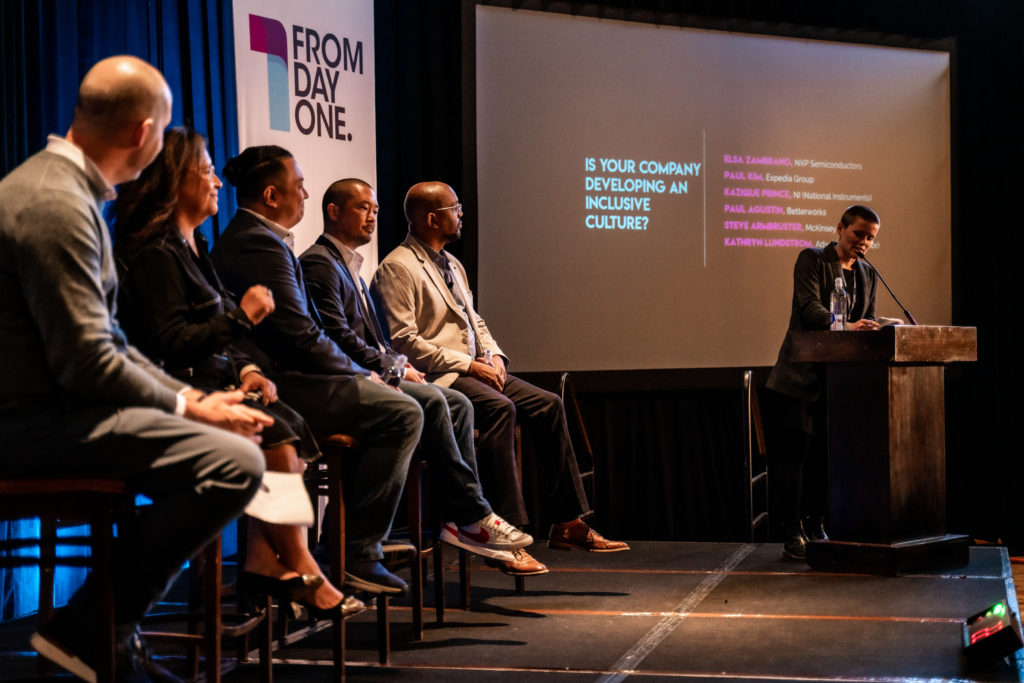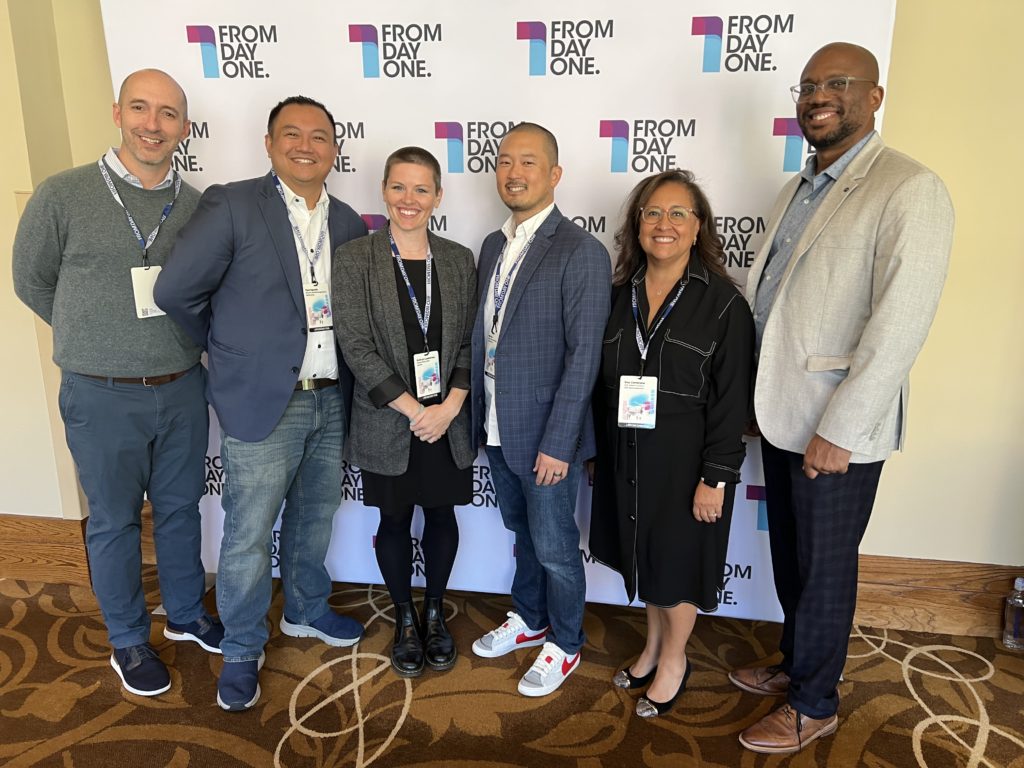Discovering the Essentials of an Inclusive Corporate Culture


Describing cultural diversity and inclusion as “great hiring bait” might seem crass, but Paul Kim, head of global implementation for Expedia Group, cut to the chase with this refreshing conversation starter, asserting that you can’t “catch the big fish without taking care of business internally.” Creating a diverse leadership team is the first key to hiring and retaining great talent, he said.
So then, what makes an inclusive culture and how do we define diversity, equity, and inclusion (DEI) when they often feel like corporate platitudes? Kathryn Lundstrom, sustainability editor at Adweek, posed this question to open a panel discussion on fostering a genuinely inclusive corporate culture, part of From Day One’s Austin conference.
Definitions ranged from “making people feel they were chosen for that reason to build a stronger team,” as Elsa Zambrano, SVP of talent and culture at NXP Semiconductors pointed out, to “creating the psychological safety that allows people to be their truest self,” said Paul Agustin, director and solutions engineer at Betterworks, a management-software company. Steve Armbruster, a partner in McKinsey & Company, agreed that “if we actually create truly diverse and inclusive teams where people take care of each other through apprenticeship, through mental health support by watching out for burnout or stress, it’s the broadest possible definition” of inclusion and belonging.
Armbruster is a firm believer that creativity and the practical exchange of culturally diverse ideas in an environment of safety and authenticity helps his firm’s clients and increases their bottom line. Defining company values is foundational, said Zambrano, who hosted hosted roundtable conversations on values across all her company’s departments globally and turned that into management training.
Inclusivity can come in the form of fun as well. Honoring and celebrating all cultural holidays, encouraging self-expression, and making sure your events are at times when everyone across your company can join helps everyone feel valued. Betterworks even decided that if they were going to do something in one location, they would do it everywhere. At the same time, it’s important to understand that people from diverse cultures feel valued in different ways and that it’s too nuanced for a blanket approach. Conversations are required to appreciate the differences.
“Equity is a little more complicated,” noted Kazique Prince, PhD, the global director of DEI and belonging at NI, formerly known as National Instruments Corp. Equity is making “sure that folks that have been historically excluded or marginalized are getting additional resources, in many ways making up for things in the past, but also making up for challenges that are still happening today.”

Prince asserted that taking an honest look at the historic corporate culture of your specific company or industry that may still be controlled by white men requires tough questions: “Are you pro-Black? Are you a feminist? Who are you as an organization? And are you willing to call those things out plainly? Are you willing to say you’re anti-racist? Those kinds of conversations are just as important as the programs, initiatives, and policies that you put in place.” If your company intends to make improvements, he advises bringing up this topic honestly in the hiring phase and letting candidates know it’s something you’re proactively seeking to change.
Finding Diverse Talent
While finding diverse talent can seem daunting, all the panelists agreed that data was essential to “opening the candidate aperture,” noted Expedia’s Kim. “Be agile and iterative about whom to pursue, and how to attract them in a way that’s actually compelling and grounded in meaning.”
Systemic and unconscious bias creates a lot of missed opportunities to bring in diverse talent. The speakers praised bias training as one of the most eye-opening and beneficial experiences they’ve ever had–and that honesty about bias leads to transparency and better hiring practices. Issuing report cards for executives, using third-party vendors to interview employees, and publicizing and discussing findings openly in meetings were all ways these panelists encourage conversations so “everyone feels they’re in it. This is not just an HR thing,” said Zambrano.
Navigating Communication Challenges and Conflicts
Instead of looking for punitive ways to get people to change their behavior, trying to understand what led to the situation from both sides and what cultural dynamics may have influenced that situation leads to better solutions. A more-carrots-than-sticks approach seemed to be the overall consensus on this topic. Prince asked, “How can we all walk away with our dignity” while creating more respect among employees? Bias training was cited again as invaluable for mitigating potential conflicts by defining and modeling inclusive behavior. McKinsey’s Armbruster said that the likelihood of mismatched expectations is reduced when managers help people self-define their own path, purpose, and meaning.
Changing Corporate Structure to Reward Diversity
Zambrano circled back to values and how important it is to “put that flag in the ground,” declaring what the company stands for and publicizing it everywhere. Kim said that Expedia doesn’t incentivize leadership in DEI because it’s expected that goals will be met and managers are held accountable for delivering on them, but leaders offer public praise when those goals are met. Betterworks utilizes a bottom-up leadership style in DEI, Agustin said, and offers a stipend for DEI team members who reach their goals.

Looking at how data is collected, analyzed, and used for better decisions ensures changes over the long term. The data McKinsey & Company has collected clearly shows that there is genuine economic value in diverse workforces. “Young people desiring purpose, meaning, and the need for psychological safety are going to generate a disproportionate amount of profit and shareholder returns,” said Armbruster. “We need to make everyone understand how important this is. Business leaders must dispel the notion that DEI initiatives are something that can be done on the side or delegated as an HR function.”
DEI is “one of those topics like sustainability that has to cut across every aspect of a company’s operations if it’s going to mean anything at all,” noted moderator Lundstrom. By incorporating these ideas into every action, DEI initiatives become a set of tools, vs. a set of rules, that can shift the health, morale, and prosperity of businesses into high gear.
Gail Gonzales is a writer, brand strategist and designer based in Austin, Texas. Her boutique agency, Evolve Your Brand, helps business owners who care about the positive evolution of people or the planet amplify their message.
The From Day One Newsletter is a monthly roundup of articles, features, and editorials on innovative ways for companies to forge stronger relationships with their employees, customers, and communities.